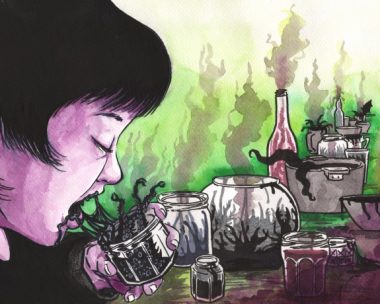Throughout this story I found myself feeling as though I couldn’t quite get a hold of anything. There is enough concrete, grounding elements, to be sure, but Herko is able to provide the reader with just enough to suspend them in the loose, rolling prose she uses to build her main character’s struggle. Expansive and enveloping, The Woman Married to a Cloud explores a woman’s jealousy and concern over a husband who just can’t be grounded.
This story was originally published in Issue 3 of Sundog Lit (http://sundoglit.com/)
The Woman Married to a Cloud
by Lindsay Herko
You are a man muddling the marriage of your wife, mixing it with egg wash—the smell of lies told online—itching her eyes out of your underwear like a yeast infection. What is wrong with you? Why are you such a troll? Your wife has been on an all-beef diet for months trying to lose weight, so she can return to the lip-like deck of your aboveground pool and surprise you in a kimono over her bathing suit. The air will smell like cut grass, and black flies in flight will try not to be caught as the sun looks delicious setting on the mount of the garage. Your kids will be up in the air-conditioning, not smelling human but smelling like the air-conditioning within Sam’s Club, when people in nylon biking suits buy long slabs of saran-wrapped Danish. Even bicyclists cling to fattening things—things that look like your legs under khaki. You are a pasty human whale who thinks being romantic is hiding the gray-colored hairs that devalue your legs behind a pair of white tuxedo pants, while offering any female a hand to do a waltz. You tell that female you are a family man, you regularly use that hand to chip the skin off your children’s apples and cut them into quiet-sized pieces—pieces that make no crunching in the kitchen or the school library where you order your kids to have a lonely, reader’s lunch. You say you are a family man, but above that you believe in love—so every spring you donate yourself on karmic charity to dance with one girl at a party where you dress like a grand-piano-playing Brahmin. Your wife must let you move that way, toward their door, because you are a cloud and her hands slip on your clots of cotton and you escape because you float and your wife wouldn’t want to hold on to you, slipping—she’s afraid of heights—as you rise up through the skylight in the kitchen.
Your wife worries in church: Are your kids part cloud too—is their cloud activated underneath their little well-tempered chests in their little Haines shirts? Will she lose a fourth grade daughter through the diamond shaped glass promenade in the food court one day, when walking to Icing via the entrance in JC Penney’s?
Will her children elope off with their father—for the spring parties cheering up other women, teaching them how to believe in love—the three of them along with their father provoking kitchen chairs in women’s kitchens across space and time to wait for them, to want them to return?
She tries to sort out her feelings asking the OnStar in her car the directions to the places in Peter Pan. As if learning an opposing brand of disappearing will make her be able to grapple with her husband in Teflon-fingered gloves as he takes off for flight.
Her husband looks like a turkey—with glasses and a gobbler he tucks in when he falls asleep in a frayed white sweatshirt, during football TV, rolling over on the couch to face the green grass of the backyard as if in sleep he is downloading the sighs of nature.
She wonders what she can do to neuter such a husband.
She puts Grape Nuts in his cereal bowl and hopes the food will weigh him down.
Next April at a book club, her worries escalate as the women read erotica, seated Indian-style in a greenhouse, swarmed by the morning sun. She imagines her husband—the human, the cloud, moving onto women in his charity—leaving sachets of white chocolate beans, clover grasses, a perfume of anise, and a balled-up panty that is personalized to say his name of Steve.
The other women in the book club have gone on to talking about the orgy that took place around an antiquated copier on page 144—men Xeroxing acts of intercourse with women and somehow a string of ants got into the images.
But all Lori can do is lay down.
Put her glass of lemonade above her heart.
And let her fears weed.
To the youngest woman in the group—Lori looks like an ironing board because of her position on the greenhouse floor and her meticulously starched blouse and belted slacks. To the older women in the crowd, everyone is thinking Lori has reached a pinnacle of rose arousal—swooning over scenarios that having a husband prevents her from trying.
[author] [author_image timthumb=’on’]http://minotaursspotlight.com/wp-content/uploads/2013/08/KabikM.jpg[/author_image] [author_info]Matthew Kabik lives in Lancaster, PA where he writes reviews and short stories from the third floor of his home (and sometimes his dining room table, if the mood strikes). His work has appeared in Structo Magazine, Five Quarterly, Cease Cows, Nib Magazine and has work forthcoming in Pea River Journal and WhiskeyPaper. He also writes reviews for Necessary Fiction. Follow him on twitter @mlkabik or visit his author site/blog at www.matchstickcircus.com[/author_info] [/author]




